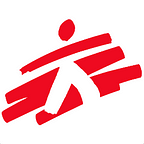I Survived Ebola. I Fear COVID-19
ER Doctor Craig Spencer is on the front lines in New York City to help slow down the spread of coronavirus
Dr. Craig Spencer is a Doctors Without Borders/Médecins Sans Frontières (MSF) board member and aid worker. He’s currently the Director of Global Health in Emergency Medicine at New York-Presbyterian/Columbia University Medical Center. In 2014, he was on the front lines of the West Africa Ebola outbreak in Guinea fighting to save lives.
He’s also an Ebola survivor. And now he’s working in the emergency room on the front lines of the coronovirus pandemic in New York — at the epicenter of the outbreak in the United States.
On Tuesday morning, he got home after another long shift in a New York hospital. He took to Twitter to let people know just how real the threat of coronavirus is — and to remind everyone to “Do your part. Stay home. Stay safe.”
Walk in for your 8am shift: Immediately struck by how the calm of the early morning city streets is immediately transformed. The bright fluorescent lights of the ER reflect off everyone’s protective goggles. There is a cacophony of coughing.
You stop.
Mask up.
Walk in.
You take sign out from the previous team, but nearly every patient is the same, young & old: Cough, shortness of breath, fever. They are really worried about one patient. Very short of breath, on the maximum amount of oxygen we can give, but still breathing fast.
You’re notified of another really sick patient coming in.
You rush over. They’re also extremely sick, vomiting. They need to be put on life support as well.
You bring them back. Two patients, in rooms right next to each other, both getting a breathing tube.
It’s not even 10am yet.
Sometime in the afternoon you recognize you haven’t drank any water. You’re afraid to take off the mask. It’s the only thing that protects you. Surely you can last a little longer — in West Africa during Ebola, you spent hours in a hot suit without water. One more patient…
By late afternoon, you need to eat. Restaurant across the street is closed. Right, everything is closed. But thankfully the hospital cafeteria is open. You grab something, wash your hands (twice), cautiously take off your mask, & eat as fast as you can. Go back. Mask up. Walk in.
Nearly everyone you see today is the same. We assume everyone is #COVIDー19. We wear gowns, goggles, and masks at every encounter. All day. It’s the only way to be safe. Where did all the heart attacks and appendicitis patients go? It’s all COVID.
When your shift ends, you sign out to the oncoming team. It’s all #COVIDー19. Over the past week, we’ve all learned the signs — low oxygen, lymphopenia, elevated D-dimer.
You share concerns of friends throughout the city without PPE.
Hospitals running out of ventilators.
You walk out and take off your mask. You feel naked and exposed. It’s still raining, but you want to walk home. Feels safer than the subway or bus, plus you need to decompress. The streets are empty. This feels nothing like what is happening inside. Maybe people don’t know???
You reflect on the fact that it’s really hard to understand how bad this is — and how bad its going to be — if all you see are empty streets. Hospitals are nearing capacity.
We are running out of ventilators.
Ambulance sirens don’t stop.
Everyone we see today was infected a week ago, or more. The numbers will undoubtedly skyrocket overnight, as they have every night the past few days. More will come to the ER. More will be stat notifications. More will be put on a ventilator.
We were too late to stop this virus. Full stop. But we can slow it’s spread. The virus can’t infect those it never meets. Stay inside. Social distancing is the only thing that will save us now.
I don’t care as much about the economic impact as I do about our ability to save lives.
And a message from Doctors Without Borders: Thank you to all the health care workers around the world who are working tirelessly to save lives. For everyone who can, stay home, stay safe.
